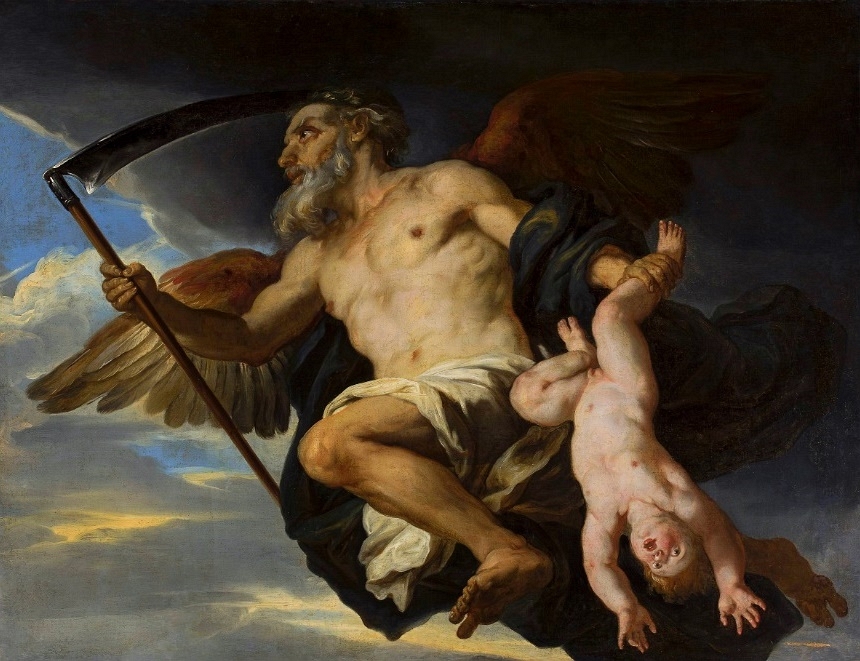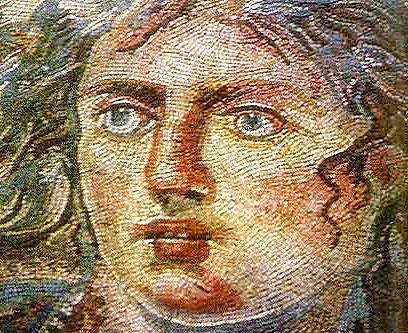|
Ophion (centaur)
In some versions of Greek mythology, Ophion (; "serpent"; ''gen''.: Ὀφίωνος), also called Ophioneus ({{lang, grc, Ὀφιονεύς) ruled the world with Eurynome before the two of them were cast down by Cronus and Rhea. Mythology Pherecydes of Syros's ''Heptamychia'' is the first attested mention of Ophion. The story was apparently popular in Orphic poetry, of which only fragments survive. Apollonius of Rhodes in his ''Argonautica'' (1.495f) summarizes a song of Orpheus: :He sang how the earth, the heaven and the sea, once mingled together in one form, after deadly strife were separated each from the other; and how the stars and the moon and the paths of the sun ever keep their fixed place in the sky; and how the mountains rose, and how the resounding rivers with their nymphs came into being and all creeping things. And he sang how first of all Ophion and Eurynome, daughter of Oceanus, held the sway of snowy Olympus, and how through strength of arm one yielded his pre ... [...More Info...] [...Related Items...] OR: [Wikipedia] [Google] [Baidu] |
Greek Mythology
Greek mythology is the body of myths originally told by the Ancient Greece, ancient Greeks, and a genre of ancient Greek folklore, today absorbed alongside Roman mythology into the broader designation of classical mythology. These stories concern the ancient Greek religion's view of the Cosmogony, origin and Cosmology#Metaphysical cosmology, nature of the world; the lives and activities of List of Greek deities, deities, Greek hero cult, heroes, and List of Greek mythological creatures, mythological creatures; and the origins and significance of the ancient Greeks' cult (religious practice), cult and ritual practices. Modern scholars study the myths to shed light on the religious and political institutions of ancient Greece, and to better understand the nature of mythmaking itself. The Greek myths were initially propagated in an oral tradition, oral-poetic tradition most likely by Minoan civilization, Minoan and Mycenaean Greece, Mycenaean singers starting in the 18th century&n ... [...More Info...] [...Related Items...] OR: [Wikipedia] [Google] [Baidu] |
Nonnus
Nonnus of Panopolis (, ''Nónnos ho Panopolítēs'', 5th century AD) was the most notable Greek epic poet of the Imperial Roman era. He was a native of Panopolis (Akhmim) in the Egyptian Thebaid and probably lived in the 5th century AD. He is known as the composer of the '' Dionysiaca'', an epic tale of the god Dionysus, and of the ''Metabole'', a paraphrase of the ''Gospel of John''. The epic ''Dionysiaca'' describes the life of Dionysus, his expedition to India, and his triumphant return. It was written in Homeric Greek and in dactylic hexameter, and it consists of 48 books at 20,426 lines. Life There is almost no evidence for the life of Nonnus. It is known that he was a native of Panopolis (Akhmim) in Upper Egypt from his naming in manuscripts and the reference in epigram 9.198 of the '' Palatine Anthology''. Scholars have generally dated him from the end of the 4th to the central years of the 5th century AD. He must have lived after the composition of Claudian's Greek ' ... [...More Info...] [...Related Items...] OR: [Wikipedia] [Google] [Baidu] |
Greek Gods
In ancient Greece, deities were regarded as immortal, anthropomorphic, and powerful. They were conceived of as individual persons, rather than abstract concepts or notions, and were described as being similar to humans in appearance, albeit larger and more beautiful. The emotions and actions of deities were largely the same as those of humans; they frequently engaged in sexual activity, and were jealous and amoral. Deities were considered far more knowledgeable than humans, and it was believed that they conversed in a language of their own. Their immortality, the defining marker of their godhood, meant that they ceased aging after growing to a certain point. In place of blood, their veins flowed with ichor, a substance which was a product of their diet, and conferred upon them their immortality. Divine power allowed the gods to intervene in mortal affairs in various ways: they could cause natural events such as rain, wind, the growing of crops, or epidemics, and were able to dicta ... [...More Info...] [...Related Items...] OR: [Wikipedia] [Google] [Baidu] |
The Classical Quarterly
''The'' is a grammatical article in English, denoting nouns that are already or about to be mentioned, under discussion, implied or otherwise presumed familiar to listeners, readers, or speakers. It is the definite article in English. ''The'' is the most frequently used word in the English language; studies and analyses of texts have found it to account for seven percent of all printed English-language words. It is derived from gendered articles in Old English which combined in Middle English and now has a single form used with nouns of any gender. The word can be used with both singular and plural nouns, and with a noun that starts with any letter. This is different from many other languages, which have different forms of the definite article for different genders or numbers. Pronunciation In most dialects, "the" is pronounced as (with the voiced dental fricative followed by a schwa) when followed by a consonant sound, and as (homophone of the archaic pronoun ''thee' ... [...More Info...] [...Related Items...] OR: [Wikipedia] [Google] [Baidu] |
Martin Litchfield West
Martin Litchfield West, (23 September 1937 – 13 July 2015) was a British philologist and classical scholar. In recognition of his contribution to scholarship, he was appointed to the Order of Merit in 2014. West wrote on ancient Greek music, Greek tragedy, Greek lyric poetry, the relations between Greece and the ancient Near East, and the connection between shamanism and early ancient Greek religion, including the Orphic tradition. This work stems from material in Akkadian, Phoenician, Hebrew, Hittite, and Ugaritic, as well as Greek and Latin. West also studied the reconstitution of Indo-European mythology and poetry and its influence on Ancient Greece, notably in the 2007 book ''Indo-European Poetry and Myth'' (''IEPM''). West also produced an edition of Homer's ''Iliad'' for the Bibliotheca Teubneriana, accompanied by a study of its critical tradition and overall philology entitled ''Studies in the Text and Transmission of the Iliad.'' A further volume on ''The Makin ... [...More Info...] [...Related Items...] OR: [Wikipedia] [Google] [Baidu] |
Ophites
The Ophites, also called Ophians (Ancient Greek, Greek Ὀφιανοί ''Ophianoi'', from ὄφις ''ophis'' "snake"), were a Christian Gnosticism, Gnostic sect depicted by Hippolytus of Rome (170–235) in a lost work, the ''Syntagma'' ("arrangement"). It is now thought that later accounts of these "Ophites" by Pseudo-Tertullian, Philastrius and Epiphanius of Salamis are all dependent on the lost ''Syntagma'' of Hippolytus. It is possible that, rather than an actual sectarian name, Hippolytus may have invented "Ophite" as a generic term for what he considered heretical speculations concerning the Serpents in the Bible, serpent of Genesis or Moses. Apart from the sources directly dependent on Hippolytus (Pseudo-Tertullian, Philastrius and Epiphanius), Origen and Clement of Alexandria also mention the group. The group is mentioned by Irenaeus in ''On the Detection and Overthrow of the So-Called Gnosis, Adversus Haereses''1:30. Pseudo-Tertullian Pseudo-Tertullian (probably the La ... [...More Info...] [...Related Items...] OR: [Wikipedia] [Google] [Baidu] |
Philo Of Byblos
Philo of Byblos (, ''Phílōn Býblios''; ; – 141), also known as Herennius Philon, was an antiquarian writer of grammatical, lexicon, lexical and historical works in Greek language, Greek. He is chiefly known for his Phoenician history assembled from the writings of Sanchuniathon. Life Philo was born in the 1st century in Byblos in what is now Lebanon. "He lived into the reign of Hadrian, of which he wrote a history, now lost." His name "Herennius" suggests that he was a client of the ''consul suffectus'' Herennius Severus through whom Philo may have achieved the status of a Roman citizen. Works Philo wrote a dictionary of synonyms, a collection of scientific writers and their works organized by category, a catalogue of cities with their famous citizens, and a ''Vita'' of the Emperor Hadrian. Some of his work is known to us by titles only; others have survived in fragmentary quotes in Christian authors. Among his works were: *''On the Acquisition and Choice of Books'' ... [...More Info...] [...Related Items...] OR: [Wikipedia] [Google] [Baidu] |
Praeparatio Evangelica
''Preparation for the Gospel'' (, ''Euangelikē proparaskeuē''), commonly known by its Latin title ''Praeparatio evangelica'', is a work of Christian apologetics written by Eusebius in the early part of the fourth century AD. It was begun about the year 313, and attempts to prove the excellence of Christianity over pagan religions and philosophies. It was dedicated to Bishop Theodotus of Laodicea. Eusebius devotes a considerable portion of the work to explaining what he sees as a debt that Greek philosophers owed to Hebrew culture. Contents The ''Praeparatio'' consists of fifteen books completely preserved. Eusebius considered it an introduction to Christianity for pagans. It remains a valuable resource for classicists because Eusebius excerpts historians and philosophers not preserved elsewhere. Among the most important of these otherwise lost works are: * Excerpts from Timon of Phlius' book ''Python'' including what is known as the '' Aristocles Passage'' in which Pyrrho su ... [...More Info...] [...Related Items...] OR: [Wikipedia] [Google] [Baidu] |
Eusebius Of Caesarea
Eusebius of Caesarea (30 May AD 339), also known as Eusebius Pamphilius, was a historian of Christianity, exegete, and Christian polemicist from the Roman province of Syria Palaestina. In about AD 314 he became the bishop of Caesarea Maritima. Together with Pamphilus, Eusebius was a scholar of the biblical canon and is regarded as one of the most learned Christians during late antiquity. He wrote the ''Demonstrations of the Gospel'', '' Preparations for the Gospel'' and ''On Discrepancies between the Gospels'', studies of the biblical text. His work '' Onomasticon'' is an early geographical lexicon of places in the Holy Land mentioned in the Bible. As "Father of Church History" (not to be confused with the title of Church Father), he produced the ''Ecclesiastical History'', ''On the Life of Pamphilus'', the ''Chronicle'' and ''On the Martyrs''. He also produced a biographical work on Constantine the Great, the first Christian Roman emperor, who was ''Augustus'' between A ... [...More Info...] [...Related Items...] OR: [Wikipedia] [Google] [Baidu] |
Chronos
Chronos (; ; , Modern Greek: ), also spelled Chronus, is a personification of time in Greek mythology, who is also discussed in pre-Socratic philosophy and later literature. Chronos is frequently confused with, or perhaps consciously identified with, the Titans, Titan, Cronus, in antiquity, due to the similarity in names. The identification became more widespread during the Renaissance, giving rise to the iconography of Father Time wielding the harvesting scythe. Greco-Roman mosaics depicted Chronos as a man turning the zodiac wheel. He is comparable to the Aion (deity), deity Aion as a symbol of cyclical time. He is usually portrayed as an old callous man with a thick grey beard, personifying the destructive and stifling aspects of time. Name During antiquity, Chronos was occasionally interpreted as Cronus. According to Plutarch, the Greeks believed that Cronus was an allegorical name for Chronos. Mythology In the Orphic tradition, the unaging Chronos was "engendered" by "e ... [...More Info...] [...Related Items...] OR: [Wikipedia] [Google] [Baidu] |
Harmonia (Greek Goddess)
In Greek mythology, Harmonia (; / harmoˈnia/, "harmony", "agreement") is the goddess of harmony and concord. Her Greek opposite is Eris and her Roman counterpart is Concordia. Harmonia is most well-known for her marriage to Cadmus and the many misfortunes that haunted her descendants, particularly those related to the fabled Necklace of Harmonia. Family Harmonia's parentage varies between accounts. She has most often been named as a daughter of the gods Ares and Aphrodite.Scholia on Homer, ''Iliad'' B, 494, p. 80, 43 ed. Bekk. as cited in Hellanicus' ''Boeotica''Apollodorus3.4/ref> This would make her the sister of other mythological figures such as Aeneas, Phobos, and Eros. In other accounts, Harmonia was born in Samothrace to Zeus and the Pleiad Electra. In this telling, Harmonia would have been the sister of Dardanus and Iasion, who, under the instruction of Zeus, were the founders of mystic rites on Samothrace.Diodorus Siculus5.48.2/ref> Almost always, Harmonia ... [...More Info...] [...Related Items...] OR: [Wikipedia] [Google] [Baidu] |
Tethys (mythology)
In Greek mythology, Tethys (; ) was a Titans, Titan daughter of Uranus (mythology), Uranus and Gaia (mythology), Gaia, a sister and wife of the Titan Oceanus, and the mother of the River gods (Greek mythology), river gods and the Oceanids. Although Tethys had no active role in Greek mythology and no established cults, she was depicted in mosaics decorating baths, pools, and triclinium, triclinia in the Greek East, particularly in Antioch and its suburbs, either alone or with Oceanus. Genealogy Tethys was one of the Titan offspring of Uranus (Sky) and Gaia (Earth). Hesiod lists her Titan siblings as Oceanus, Coeus, Crius, Hyperion (mythology), Hyperion, Iapetus (mythology), Iapetus, Theia, Rhea (mythology), Rhea, Themis, Mnemosyne, Phoebe (Titaness), Phoebe, and Cronus. Tethys married her brother Oceanus, an enormous river encircling the world, and was by him the mother of numerous sons (the River gods (Greek mythology), river gods) and numerous daughters (the Oceanids). Accordi ... [...More Info...] [...Related Items...] OR: [Wikipedia] [Google] [Baidu] |






